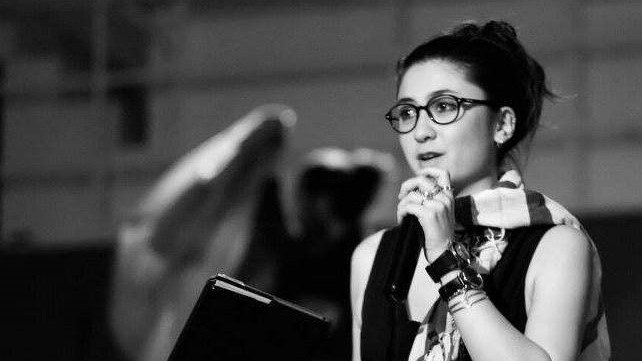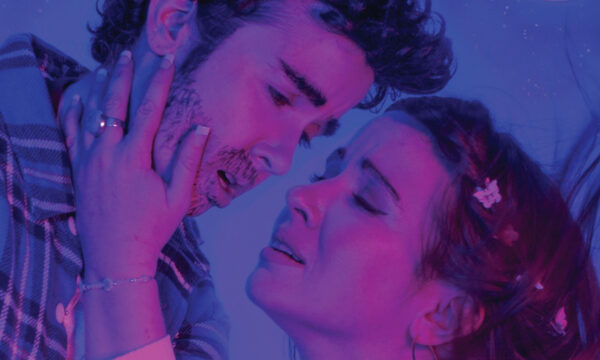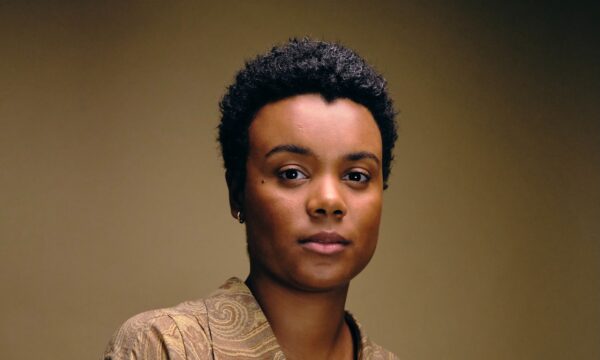“Don’t let outdated perceptions of opera hold you back”: An interview with #OperaHarmony organiser Ella Marchment

#OperaHarmony is a new project designed as a response to the Coronavirus pandemic. It seeks to assemble teams from across the globe to create new and exciting “micro-operitas” to be shared online. These short pieces will include work from composers, librettists, directors and singers who record and share their creations with the world.
We caught up with Ella Marchment, the organiser of #OperaHarmony. We chatted with her about her inspiration, the central idea, in which ways it relates to Covid-19, and her personal creative inspirations.
Hi Ella, thank you for your time. How and when did the idea for #OperaHarmony come about?
I had taken over directing a show at Dutch National Opera in March when, just a few hours before the final pre-dress run, the show was cancelled and the theatre was closed because of the coronavirus lockdown. Over the next few days, more of my future productions were cancelled or postponed indefinitely. One evening, I wrote a Facebook status to see if any of my friends would like to use the lockdown to explore how to write and stage an online opera, just for the sheer fun of trying to do something that we hadn’t done before. The next morning, I woke to find that over two hundred people had written to say they wanted to be involved. I was totally gobsmacked!
Who will be participating in #OperaHarmony?
More than two hundred people have signed up for #OperaHarmony, working in nineteen intercontinental teams of composers, librettists, directors, designers, singers, musicians, sound and video editors, etc. We’re not just going to write and sing operas with a piano accompaniment, we’re actually going to stage them, even with people working and performing in different countries. It will be a massive challenge, both artistically and logistically, to mix so many different sound and video files into single films that will be available to stream – especially when most of us don’t have much experience at putting such technological challenges together. We’ve got some really great artists working with us, and we’re super grateful to everyone who is giving their time and ideas so freely.
There is one person I must single out though, and that’s Jonas Rose Høeg, who I met while directing a technically complex Magic Flute for Copenhagen Opera Festival a few summers ago. Jonas runs a production company called Soundsright, based in Copenhagen, and he is helping all the groups to mix their sound files, which is a huge undertaking. It’s surreal to be creating opera between so many nations, despite borders being closed. Truly an international art form.
Are there any general guidelines or themes the composers and librettists are asked to explore when creating a micro-operita for #OperaHarmony?
The composers and librettists are writing around the themes of “distance” or “community”. I think these sum up the two main faces of the lockdown: enforced physical distancing initially, and then the sense of the fragmented-yet-bonded community that has resulted from it. Even though we are apart, we still connect, and we still have multiple communities that we identify with, whether family, friends, interest groups, artists, or whatever. So many bonds are being made and strengthened as we FaceTime and Zoom into other peoples’ homes, and we interact in ways that the virus cannot stop us doing.
When will we be able to see the first micro-operita? How long are they expected to be, on average?
Each opera will be between five and ten minutes in length, in part because writing and staging an opera takes a lot of time and effort – and so the shorter, the better – but also because we want to challenge ourselves to see whether we can tell complete stories in limited time frames. The groups are progressing at different rates (people have so many other things to juggle in their lives), but we hope the first release will be in May, and the rest will follow in a staggered manner until the end of July.
How did you start out directing opera?
I got the opera bug when I sang and danced in the chorus of Dorset Opera when I was sixteen. While I enjoyed performing, what really intrigued me was how a director could interpret and shape a work, not just stage it. We often talk about film directors as auteurs, but I also think that the best stage works – whether theatre or opera – are those where the director is prepared to give the audience something above and beyond what they might have expected or experienced before. The first opera I directed at university was John Gay’s The Beggar’s Opera, which I staged at a nightclub in Brixton that more typically hosted reggae and hip-hop collectives. I have gone on to work throughout Europe, Russia, and America, always looking to encourage my production teams to push the envelope as hard as they can, while still honouring opera’s great traditions.
Are you personally involved in the work on a particular micro-operita? If so, what is it about?
I originally thought I’d get a few people to make one mini opera with me, but with so many artists now involved, I am concentrating on coordinating and helping out wherever I am needed. 90 per cent of the people involved have never worked together or even met each other before, so I’m really enjoying mixing and stirring the creative pot, and forging relationships that only exist because of coronavirus. Hopefully, those relationships will last a lifetime. Light in a time of darkness.
However, somewhat ironically, before #OperaHarmony was even a thing, I was already working at a distance with the singer-songwriter and actress Daisy Boulton. We’ve been in conversation with the writer Jeremy Gavron over the past four years about creating a one-woman show adaptation of his book A Woman on the Edge of Time, because we think it’s one of the best contemporary feminist novels currently available. Singing is going to underpin our adaptation, so Daisy and I started developing music at the beginning of this year, even though she was in Los Angeles and I was in the Netherlands. The only way for us to work together was online, and we also invited producer Johnny Stanley to collaborate with us. Even at a distance, we managed to write one track, and when the lockdown hit, we decided to turn it into a music video. It also fits with the theme of “distance”, because the story of A Woman on the Edge of Time is about Hannah Gavron – Jeremy’s mother – who took her own life when she was just twenty-nine. The song is about the sense that Hannah was alone, even when in a community setting, and it concludes with an irrepressible chorus of women who are still striving for equality now. We were going to release it independently, but have since decided that – in light of the methodology and subject matter involved – we will publish it as an #OperaHarmony piece.
Are you particularly excited about a particular project?
I’m excited about all of them. We’re bringing together people from all over the planet, and, inevitably, they all come with different ideas and cultures, shaped by their wide-ranging backgrounds and experiences. I really have no preconceptions about what the teams will produce, because although we know what people have done individually in the past, we don’t know what they will produce when they are working in ways they have never worked before, let alone collaborating with people they had never met in their lives. There’s real symbiosis and antibiosis going on, as people spark and fire each other’s creativity. For me, the process of the journey is just as important as the product of the destination. Sure, some partnerships will work better than others, but even across teams, people are sharing ideas and offering to help each other out. We are more at one, perhaps, than we have ever been.
Do you have a favourite opera or a composer?
I’ve never really thought about anything in that way. To a director, every piece of music and every libretto is a trove of potential, so I wouldn’t want to choose a favourite work and then find myself judging everything else by that treasured exemplar. I am always open to listening to different works and composers, and always keen to hear and see how other directors interpret works, hoping to find something that redefines a moment for me, or which challenges and enthrals my own imagination. There are so many operas that I truly love, and if you were to ask me which one I would choose as my absolute favourite, my answer would definitely change depending on my feelings at the time. Opera really is all about capturing emotions and allowing us to see ourselves in different lights.
What impact do you believe #OperaHarmony will have on the world during the coronavirus crisis, and on the world of arts in particular?
Chaos theory tells us that small actions can produce strikingly large consequences, the so-called butterfly effect. I’m neither a mathematician nor a clairvoyant, so I really can’t say what the likelihood is of #OperaHarmony having a small or large consequence in the future, but I do know that it has already brought people together and set them off on their own yellow brick roads, wherever those roads might lead them. Some people are working in their specialist fields. Others are working in new areas, so it is possible that #OperaHarmony might even lead some people to set off on entirely new career paths. During this inauspicious period, #OperaHarmony is offering a creative and social outlet that is proving to be worthwhile for everyone involved. In the long term, perhaps some of the teams will continue to work together; but who knows? I think that what we are doing now is strengthening and widening the community in which we work, and fostering new levels of support and interdependency. I hope that the wellspring of positivity started by #OperaHarmony will flow throughout our lives, reminding us that good will eventually triumph, even in the bleakest of times.
What can #OperaHarmony, and opera in general, teach us about how to respond to coronavirus, if anything?
I think it has shown us four main things. First, that nothing can stop people doing whatever it is they love to do. Second, that people can adapt to change very quickly and very positively. Third, that we will endure, because while we can’t always do everything, we can always do everything we can. And fourth, that time heals everything, and that humour and determination can speed the healing process up.
Do you think the virus will have a lasting impact on the way we perceive and engage with opera or theatre?
When you look at what people are doing now, you realise how important the arts are. Where would we all be during the lockdown without films, box sets, plays, operas, recorded music, and countless other arts streams to entertain us, and distract us, and help to keep us sane? I get the sense that many people are going to question what their lives really mean, and that they will want to improve their work–life balance in terms of their family, friends, and free time. So many people are currently more in tune with their own creativity than they have ever been, and I would like to think that the groundswell of change that is happening right now will help opera, theatre, and all the arts to thrive in the future. The landscape will certainly be altered, but it is art that expresses what we
are and which entertains and enriches us.
You mention that the focus for #OperaHarmony is on “distance” and “community”. Do you have any thoughts on how young people can engage with opera, given that it is perceived by some as being elitist or relating to an older demographic?
Parts of opera are elitist and more readily relatable to an older demographic, just as some books and some plays and some films and some aspects of all other art forms are equally elitist and more readily relatable to an older demographic: there’s nothing odd or unique about any of that. What people need to be aware of is that opera comes in a range of flavours that suit different tastes. I’ve run opera club nights in a warehouse in Peckham that usually stage innovative theatre, art, cabaret, and music events. The clubbers have included teenagers and octogenarians, coming together to listen to modern takes on the classics – such as a rock version of Tosca – alongside works that are so avant-garde and atypical that you’d be hard to know whether they should actually be classed as opera or not. If the pandemic has taught us anything, perhaps it is that today is the most important time of all. So if anyone of any age wants to get involved with opera, do it now, and don’t let outdated perceptions and misconceptions hold you back. The most important thing of all is to join in: forget your inhibitions and be free.
Thank you so much for your time!
Michael Higgs
Photo: Nick Rutter
For further information about #OperaHarmony visit their Facebook page here.
























Facebook
Twitter
Instagram
YouTube
RSS